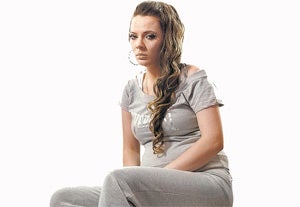Last Night's Television: Kimberley: Young Mum Ten Years On<br/>Who Killed The Honey Bee?, BBC4
Mother's courage goes a long way

Ten years ago, Daisy Asquith made a documentary, Fifteen, telling the story of a strong-minded young girl called Kimberley, who wished that her mum would worry less, and that her boyfriend would call, and that she hadn't been raped by a 21 year old when she was 12.
Kimberley could be breathtakingly single-minded, and enormously, exasperatingly, stubborn. But she was charming nonetheless: feisty in an unaffected way, laughing at her "crumby" neighbourhood and joking about her bad taste in boys. Ten months after the programme ended, she fell pregnant, and nine months later, was a struggling mother in an abusive relationship. So goes the vicious cycle.
We don't see what happened next, but we hear Kimberley's account. With domestic violence a feature, her son was soon taken away. It's impossible not to feel sympathy, which is not to say that the authorities did the wrong thing. By the time she's being filmed again – by Asquith, in this equally compelling follow-up Kimberley: Young Mum Ten Years On – she has had another son, Harvey, and his progress is being closely monitored. With Harvey's dad long gone, Kimberley is hoping to prove she can go it alone, though given her track record, that means jumping through an inordinate number of institutional hoops. She has to take Harvey for medicals, show her commitment to his education, and attend parenting classes. When playtime starts to get too physical, her anxiety levels shoot up; the last thing she needs is a scratched and bruised little boy who looks like he's taken a beating. It's a tall order, for anyone, particularly when they're living on a weekly income of £110. And, so, a pattern emerges: Kim is in penitence for her past, which is making her future that much more difficult.
She is, however, making impressive progress; she's entangled in another relationship, though this time her partner of choice has a fair bit to recommend him. He's a single parent, too, and his son is doing well. They go on family dates and play with the kids. Midway through filming, in the wake of a glowing school report for Harvey and strong recommendations for herself, she was let off the leash a little. Instead of weekly meetings, she would only have to attend one a month. And instead of having her name on the child protection register, she just has a final three-month surveillance period. Then, just as things are becoming really Brady bunch, bam! Calamity strikes. Kimberley's pregnant again.
Here, I confess, a little exasperation set in. Of course, it's her right to have children, but it's clearly the last thing she actually wants. "Do you want the bad news or the bad news?" she asked the camera. "It's all bad news!" She decided to keep the baby, despite the father's reluctance. As happens, that decision appeared to spread balm over a few wounds. As the show ended, Kimberley was bustling around, showing off her new daughter, though she was still struggling to let her boyfriend move in and play happy families. Depending on which decision she takes, there may be another documentary in 10 years' time.
And so from one very British struggle, to quite another, with the BBC4's Who Killed the Honey Bee?, which documented the truly startling decline of Britain's bee population. "When we think of beehives we have this cuddly Winnie the Pooh image," explains Bee Wilson, the neatly named author of The Hive. "But actually, they're more like a mausoleum." Oh, dear. In fact, this is the shape of much to come; as it turns out, we're the ones who killed the honey-bee, a third of the population died last year, and we've got a hefty price to pay for it, too: one in three bites of food are dependent on bees, since they're the ones who pollinate crops.
The mausoleums/honey hives have eventually given way to a rather more humane version. But, in their place, a dozen other hazards sprung up. Like pesticides. They're supposed to be discriminatory – in the same hopeless way smart bombs are supposed to be – but, like the smart bombs, they're actually pretty dumb. In fact, they're probably worse for the bees than the old-fashioned, spray-and-be-damned kind, as they're aimed at the seeds, and the problem has become systemic. Now when the bee pollinates a plant, it picks up a cocktail of drugs along the way. Another problem, clearly, is the way in which beekeepers loan their insects out. Most of last night's show was spent interviewing these beekeepers, whose livelihood depends on farmers renting their stock.
It does all seem absurd, the idea of an aeroplane ferrying bees from Australia to California and back. How did the simple practice of beekeeping become so convoluted? And how can it be reversed? The Government has just announced £10m worth of funding to find out the answer. Hopefully, by the time that happens we won't be living in a bee-free world.
a.jarvis@independent.co.uk
Subscribe to Independent Premium to bookmark this article
Want to bookmark your favourite articles and stories to read or reference later? Start your Independent Premium subscription today.

Join our commenting forum
Join thought-provoking conversations, follow other Independent readers and see their replies